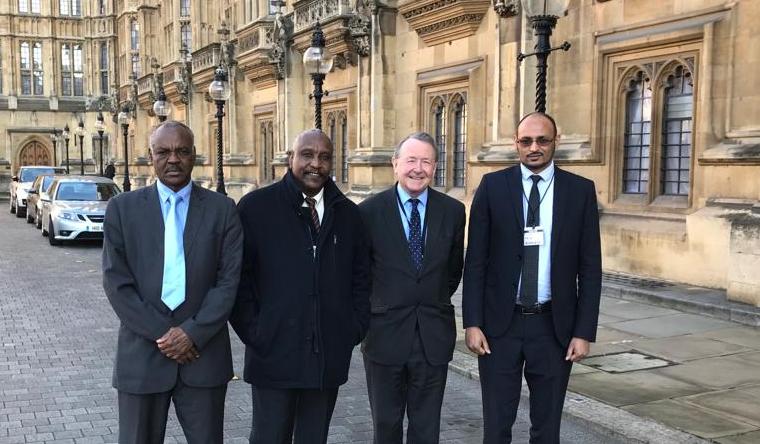Lord Alton calls on British govt to reconsider dialogue with Sudan

February 14, 2019 (LONDON) – British Lord Alton Thursday has called on the Theresa May’s Government to review its policy towards Sudan and to stop the strategic dialogue process with Khartoum.
Lord Alton of Liverpool, an Officer and former Chairman of the All Party Parliamentary Group for Sudan and South Sudan, met on Thursday with a delegation of the Sudanese opposition led by Yasir Arman who is the External Affairs Secretary of the Sudan Call.
In a statement extended to Sudan Tribune, the British lawmaker said the anti-government protests, including the prominent role played in the protests by youth, women and professionals, have “changed the political landscape in Sudan”.
“The British Government needs to listen to the voices of the people of Sudan and engage with signatories of the Declaration for Freedom and Change,” he said.
“The time has come to review its policy of phased engagement with the Government of Sudan. It would not be appropriate to continue the UK/Sudan Strategic Dialogue while the Government of Sudan is killing its own people,” he further added.
Arman who is also, the deputy chairman of the SPLM-N led by Malik Agar was flanked by Mohamed al Ansari, head of National Umma Party in the UK, and Mohamed Bashir of Sudan Liberation Movement led by Minni Minnawi.
Last week, Arman met with the British Special Envoy for Sudan and South Sudan Chris Trott and called on the British government to stop the strategic dialogue process which aims to normalize bilateral relations and support Sudanese government efforts to break international isolation as well as to get debt relief.
This debt relief would allow Sudan to normalize relations with its creditors, including international financial institutions (IFIs) such as the World Bank.
Sudanese opposition groups regret the “silence and laxity” of the international community towards the bloody repression of peaceful protests in the country.
Arman said they hope that Britain and France step up the formation of an international commission of inquiry on the killing of protesters during the upcoming 40th regular session of the Human Rights Council which will begin on 25 February.
The Sudanese government has admitted the killing of 31 people during the two-month protests in various Sudanese cities since mid-December, but the opposition and human rights groups say over 50 people have been killed by the regime’s security forces.
(ST)
